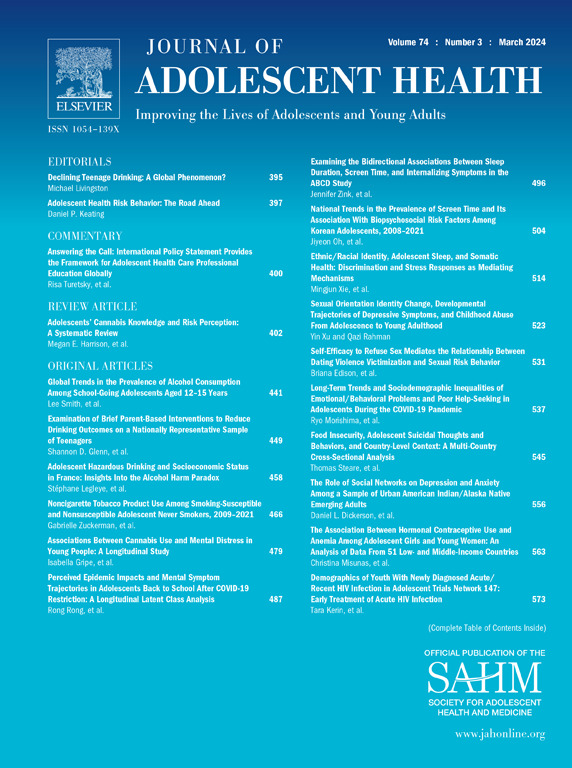Childhood Adversity and Civic Engagement During Emerging Adulthood
IF 5.5
2区 医学
Q1 PEDIATRICS
引用次数: 0
Abstract
Purpose
Childhood adversity is linked to poorer adult health; prior research has established a reciprocal association between health and civic engagement. However, little research has examined the relationship between adverse childhood experiences (ACEs) and civic engagement. We examined whether ACEs are associated with civic engagement at ages 18–26 years and evaluated the potential moderating role of perceived survival expectations (PSE) (i.e., likelihood of living to age 35).
Methods
Data are from Waves I, III, and IV of the National Longitudinal Study of Adolescent to Adult Health. Multivariable linear regression using survey weights was used to model associations between experiencing 0, 1, 2–3, or 4+ ACEs and civic engagement (composite score) overall and by type of ACE (i.e., child maltreatment, violent victimization in the community, family member suicide, family substance abuse, divorce, household member incarceration, and family member death). An ACE by PSE interaction term was tested.
Results
Twelve thousand two hundred eighty eight participants were included. Experiencing 2–3 ACEs (β = −0.14; confidence interval [CI]: −0.23, −0.043) and 4+ ACEs (β = −0.17; CI: −0.32, −0.025) were each associated with lower civic engagement compared to experiencing no ACEs. Violent victimization (β = −0.14; CI: −0.22, −0.058) and family substance abuse (β = −0.13; CI: −0.21, −0.049) were negatively associated with civic engagement, accounting for multiple comparisons. There was no evidence of moderation by PSE.
Discussion
ACEs, particularly violent victimization in the community and family substance abuse, may shape civic development. Interventions could promote civic engagement and lessen the impact of childhood adversity on individual and community health.
童年逆境与成年初期的公民参与。
目的:童年时期的逆境与成年后较差的健康状况有关;先前的研究已经确立了健康与公民参与之间的相互关联。然而,很少有研究调查不良童年经历(ace)和公民参与之间的关系。我们研究了ace是否与18-26岁的公民参与有关,并评估了感知生存期望(PSE)(即活到35岁的可能性)的潜在调节作用。方法:数据来自全国青少年到成人健康纵向研究的第一、三、四期。使用调查权重的多变量线性回归来模拟经历0、1、2-3或4+ ACE与公民参与(综合得分)之间的关联,并按ACE类型(即儿童虐待、社区暴力受害、家庭成员自杀、家庭药物滥用、离婚、家庭成员监禁和家庭成员死亡)进行建模。通过PSE相互作用项对ACE进行检验。结果:共纳入12288名受试者。经历2-3次ace (β = -0.14;可信区间[CI]: -0.23, -0.043)和4 + ace(β= -0.17;CI: -0.32, -0.025)与没有经历过ace的人相比,每个人的公民参与度都较低。暴力受害(β = -0.14;CI: -0.22, -0.058)和家庭药物滥用(β = -0.13;CI: -0.21, -0.049)与公民参与负相关,可以进行多重比较。没有证据表明PSE有缓和作用。讨论:ace,特别是社区和家庭滥用药物的暴力受害者,可能会影响公民的发展。干预措施可以促进公民参与,减轻童年逆境对个人和社区健康的影响。
本文章由计算机程序翻译,如有差异,请以英文原文为准。
求助全文
约1分钟内获得全文
求助全文
来源期刊

Journal of Adolescent Health
医学-公共卫生、环境卫生与职业卫生
CiteScore
10.40
自引率
3.90%
发文量
526
审稿时长
46 days
期刊介绍:
The Journal of Adolescent Health is a scientific publication dedicated to enhancing the health and well-being of adolescents and young adults. Our Journal covers a broad range of research topics, spanning from the basic biological and behavioral sciences to public health and policy. We welcome a variety of contributions, including original research papers, concise reports, literature reviews, clinical case reports, opinion pieces, and letters to the editor. We encourage professionals from diverse disciplines such as Anthropology, Education, Ethics, Global Health, Health Services Research, Law, Medicine, Mental and Behavioral Health, Nursing, Nutrition, Psychology, Public Health and Policy, Social Work, Sociology, and Youth Development to share their expertise and contribute to our mission of promoting adolescent health. Moreover, we value the voices of young individuals, family and community members, and healthcare professionals, and encourage them to submit poetry, personal narratives, images, and other creative works that provide unique insights into the experiences of adolescents and young adults. By combining scientific peer-reviewed research with creative expressions, our Journal aims to create a comprehensive understanding of the challenges and opportunities in adolescent and young adult health.
 求助内容:
求助内容: 应助结果提醒方式:
应助结果提醒方式:


